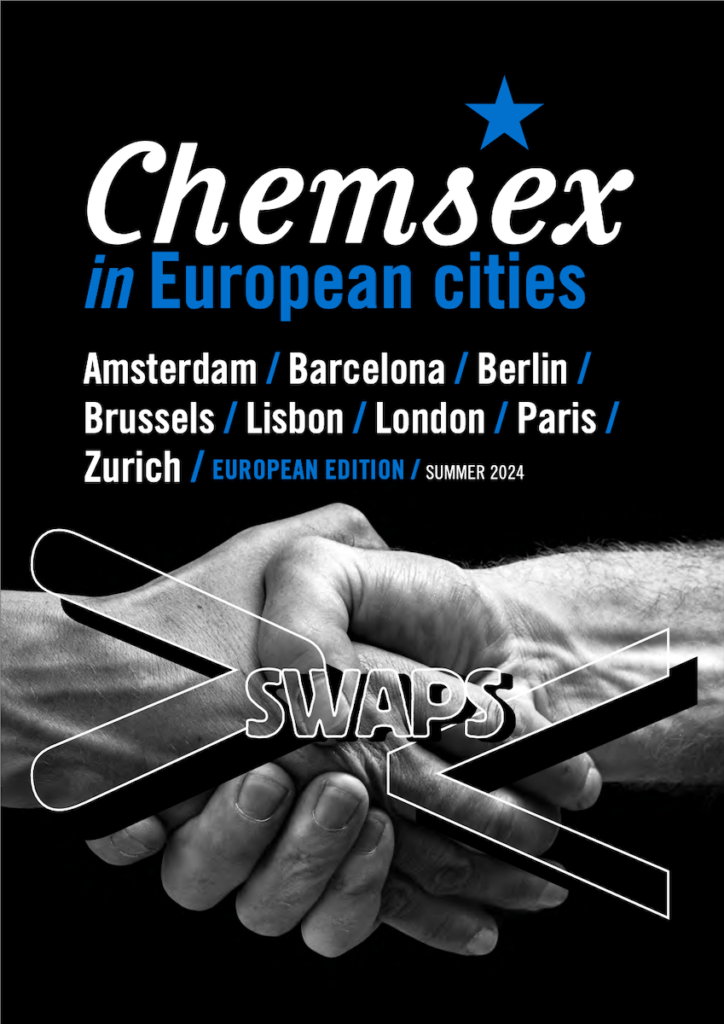Special European Issue – Summer 2024
In every metropolis, in every region of Europe, chemsexChemsex Le chemsex recouvre l’ensemble des pratiques relativement nouvelles apparues chez certains hommes ayant des relations sexuelles avec des hommes (HSH), mêlant sexe, le plus souvent en groupe, et la consommation de produits psychoactifs de synthèse. is present. It only involves a minority, but it’s more deeply rooted than it was five years ago (Swaps n°92-93). Responses differ from one country to another, from one NGO, community or state experience to another. This is the purpose of the survey that Swaps conducted in Amsterdam, Barcelona, Berlin, Brussels, Lisbon, London, Paris and Zurich. It is not intended to be exhaustive, but rather to share experiences. The survey was carried out with support from the City of Paris Municipal Services and the Interministerial Mission for Combating Drugs and Addictive Behaviour (MILDECA).
Chemsex is a social phenomenon, a set of practices involving sex and the use of drugs, as well as a way to meet for men who like men. The definition of chemsex: the sexual intentionality of synthetic drug use. The drugs heighten sexual sensations, relationships and pleasure in a way that is reported to be unequalled, exceptional and different. The products are also constantly renewed thanks to the “adaptive genius” of a number of shadowy chemists and the commercial capacity of traffickers, aided by social networks and dating apps.
It’s hard to say whether it’s supply or demand that is driving the game. Chemsex allows people to meet on a large scale and with products gives them the opportunity to get together with fellow beings, but also the young with the not so young, the handsome with the less handsome, the wealthy with the financially fragile, the successful with the less successful, those who want it and those who are less interested, raising the central question of consent under the influence of products. It is a new form of sexuality based on dating apps, it is present all over Europe and based on supplying drugs thanks to the Internet and the uberisation of delivery, marginalising gay-friendly establishments even further. It comes at a time when the risk with regard to one’s sexuality – and life itself – has eased thanks to HIV treatment and PrEPPrEP Prophylaxie Pré-Exposition. La PrEP est une stratégie qui permet à une personne séronégative exposée au VIH d'éliminer le risque d'infection, en prenant, de manière continue ou «à la demande», un traitement anti-rétroviral à base de Truvada®. and removes much of the dark cloud of HIV as a deterrent.
Chemsex can be an exhilarating experience that some people control and handle by managing the troublesome aspects, the so-called “happy chemsexers”. The fact is that these products that give you the thrills and spills you’re looking for also have negative psychological, psychic and physical effects, that can lead to social isolation, a slippage of personal finances, a possible move away from studies or work, or from close relationships, and addiction when you can’t get out of it any more. Accidents and fatal overdoses, such as the G-Hole, highlight the extreme risk posed by products that you are not familiar with, that you take too much of, or without having someone close to you who you can call for help in the event of an overdose emergency or an accident. Not to mention the infection risks, from HIV and HCV to complications related to injecting (“slam”) and the negative psychiatric repercussions beyond dependence.
The relational, sexual and addictive dimensions of chemsex also meet up with the psychological fragility of MSM, the result of the suffering caused by heteronormativity and the psychological and physical assaults suffered very early in life, which still manifest themselves in brutal or insidious forms.
But gays are used to collectively taking matters into their own hands: the long-standing struggle for gay pride, the experience of fighting to be the primary actors in the response to AIDS, the conquest of harm reduction for drug users. They use it here for their regulation of chemsex in different ways: self-regulation, collective information, self-support, developing new responses or borrowing from related fields. For some, preventing chemsex is “mission impossible”. The beautiful dragon is in the room, good and wanted. We haven’t really been any more successful with other products. Research is underway, particularly in France under the auspices of the National Agency for Research on AIDS and Emerging Infectious Diseases (ANRS-MIE), the French National Institute of Health and Medical Research (Inserm) and the NGO Aides.
The community response is a Harm & Risk Reduction strategy which has yet to be invented and organised out in the field, drawing on the experience gained with HIV, using social networks and proposing information about the products: drug testing, prevention of the risks associated with injecting, optimising prevention and treatment of STIs and HIV, being able to respond to life-threatening emergencies, without forgetting to remind all the actors about the norms of consent. It also means raising awareness and mobilising addiction and sexology professionals and other sexual health stakeholders. It also means proposing activities to combat the isolation and loneliness that the real/false chemsex encounters do not really resolve.
These elements are present in community responses, but not in all of them. They vary from country to country and from community to community, so we need to enrich them with the best of each, which is the aim of this issue of Swaps.
What can addictologists and sexologists do? Listen, reassure, advise and, classically, treat, when the person is overwhelmed by suffering or senses the distress and isolation that chemsex brings when it becomes “chemchems”.
What can public authorities do? Facilitate and allow the community response to get moving, support it institutionally and on a long-term basis, and protect it from a purely repressive top-down authoritarian intervention.
Didier Jayle, head of publication, Swaps
Gilles Pialoux, chief editor, Swaps

Ce numéro est également disponible en français:
Chemsex dans 8 villes d’Europe.

